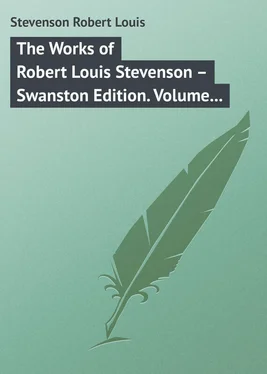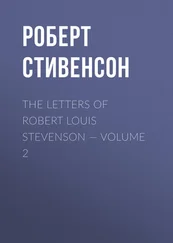Robert Stevenson - The Works of Robert Louis Stevenson – Swanston Edition. Volume 3
Здесь есть возможность читать онлайн «Robert Stevenson - The Works of Robert Louis Stevenson – Swanston Edition. Volume 3» — ознакомительный отрывок электронной книги совершенно бесплатно, а после прочтения отрывка купить полную версию. В некоторых случаях можно слушать аудио, скачать через торрент в формате fb2 и присутствует краткое содержание. Жанр: foreign_prose, на английском языке. Описание произведения, (предисловие) а так же отзывы посетителей доступны на портале библиотеки ЛибКат.
- Название:The Works of Robert Louis Stevenson – Swanston Edition. Volume 3
- Автор:
- Жанр:
- Год:неизвестен
- ISBN:нет данных
- Рейтинг книги:4 / 5. Голосов: 1
-
Избранное:Добавить в избранное
- Отзывы:
-
Ваша оценка:
- 80
- 1
- 2
- 3
- 4
- 5
The Works of Robert Louis Stevenson – Swanston Edition. Volume 3: краткое содержание, описание и аннотация
Предлагаем к чтению аннотацию, описание, краткое содержание или предисловие (зависит от того, что написал сам автор книги «The Works of Robert Louis Stevenson – Swanston Edition. Volume 3»). Если вы не нашли необходимую информацию о книге — напишите в комментариях, мы постараемся отыскать её.
The Works of Robert Louis Stevenson – Swanston Edition. Volume 3 — читать онлайн ознакомительный отрывок
Ниже представлен текст книги, разбитый по страницам. Система сохранения места последней прочитанной страницы, позволяет с удобством читать онлайн бесплатно книгу «The Works of Robert Louis Stevenson – Swanston Edition. Volume 3», без необходимости каждый раз заново искать на чём Вы остановились. Поставьте закладку, и сможете в любой момент перейти на страницу, на которой закончили чтение.
Интервал:
Закладка:
Meanwhile, whether as a man, a husband, or a poet, his steps led downward. He knew, knew bitterly, that the best was out of him: he refused to make another volume, for he felt it would be a disappointment; he grew petulantly alive to criticism, unless he was sure it reached him from a friend. For his songs, he would take nothing; they were all that he could do; the proposed Scots play, the proposed series of Scots tales in verse, all had gone to water; and in a fling of pain and disappointment, which is surely noble with the nobility of a viking, he would rather stoop to borrow than to accept money for these last and inadequate efforts of his muse. And this desperate abnegation rises at times near to the height of madness; as when he pretended that he had not written, but only found and published, his immortal “Auld Lang Syne.” In the same spirit he became more scrupulous as an artist; he was doing so little, he would fain do that little well; and about two months before his death, he asked Thomson to send back all his manuscripts for revisal, saying that he would rather write five songs to his taste than twice that number otherwise. The battle of his life was lost; in forlorn efforts to do well, in desperate submissions to evil, the last years flew by. His temper is dark and explosive, launching epigrams, quarrelling with his friends, jealous of young puppy officers. He tries to be a good father; he boasts himself a libertine. Sick, sad, and jaded, he can refuse no occasion of temporary pleasure, no opportunity to shine; and he who had once refused the invitations of lords and ladies is now whistled to the inn by any curious stranger. His death (July 21, 1796), in his thirty-seventh year, was indeed a kindly dispensation. It is the fashion to say he died of drink; many a man has drunk more and yet lived with reputation, and reached a good age. That drink and debauchery helped to destroy his constitution, and were the means of his unconscious suicide, is doubtless true; but he had failed in life, had lost his power of work, and was already married to the poor, unworthy, patient Jean, before he had shown his inclination to convivial nights, or at least before that inclination had become dangerous either to his health or his self-respect. He had trifled with life, and must pay the penalty. He had chosen to be Don Juan, he had grasped at temporary pleasures, and substantial happiness and solid industry had passed him by. He died of being Robert Burns, and there is no levity in such a statement of the case; for shall we not, one and all, deserve a similar epitaph?
The somewhat cruel necessity which has lain upon me throughout this paper only to touch upon those points in the life of Burns where correction or amplification seemed desirable, leaves me little opportunity to speak of the works which have made his name so famous. Yet, even here, a few observations seem necessary.
At the time when the poet made his appearance and great first success, his work was remarkable in two ways. For, first, in an age when poetry had become abstract and conventional, instead of continuing to deal with shepherds, thunderstorms, and personifications, he dealt with the actual circumstances of his life, however matter-of-fact and sordid these might be. And, second, in a time when English versification was particularly stiff, lame, and feeble, and words were used with ultra-academical timidity, he wrote verses that were easy, racy, graphic, and forcible, and used language with absolute tact and courage as it seemed most fit to give a clear impression. If you take even those English authors whom we know Burns to have most admired and studied, you will see at once that he owed them nothing but a warning. Take Shenstone, for instance, and watch that elegant author as he tries to grapple with the facts of life. He has a description, I remember, of a gentleman engaged in sliding or walking on thin ice, which is a little miracle of incompetence. You see my memory fails me, and I positively cannot recollect whether his hero was sliding or walking; as though a writer should describe a skirmish, and the reader, at the end, be still uncertain whether it were a charge of cavalry or a slow and stubborn advance of foot. There could be no such ambiguity in Burns; his work is at the opposite pole from such indefinite and stammering performances; and a whole lifetime passed in the study of Shenstone would only lead a man further and further from writing the “Address to a Louse.” Yet Burns, like most great artists, proceeded from a school and continued a tradition; only the school and tradition were Scottish, and not English. While the English language was becoming daily more pedantic and inflexible, and English letters more colourless and slack, there was another dialect in the sister country, and a different school of poetry, tracing its descent, through King James I., from Chaucer. The dialect alone accounts for much; for it was then written colloquially, which kept it fresh and supple; and, although not shaped for heroic flights, it was a direct and vivid medium for all that had to do with social life. Hence, whenever Scottish poets left their laborious imitations of bad English verses, and fell back on their own dialect, their style would kindle, and they would write of their convivial and somewhat gross existences with pith and point. In Ramsay, and far more in the poor lad Fergusson, there was mettle, humour, literary courage, and a power of saying what they wished to say definitely and brightly, which in the latter case should have justified great anticipations. Had Burns died at the same age as Fergusson, he would have left us literally nothing worth remark. To Ramsay and to Fergusson, then, he was indebted in a very uncommon degree, not only following their tradition and using their measures, but directly and avowedly imitating their pieces. The same tendency to borrow a hint, to work on some one else’s foundation, is notable in Burns from first to last, in the period of song-writing as well as in that of the early poems; and strikes one oddly in a man of such deep originality, who left so strong a print on all he touched, and whose work is so greatly distinguished by that character of “inevitability” which Wordsworth denied to Goethe.
When we remember Burns’s obligations to his predecessors, we must never forget his immense advances on them. They had already “discovered” nature; but Burns discovered poetry – a higher and more intense way of thinking of the things that go to make up nature, a higher and more ideal key of words in which to speak of them. Ramsay and Fergusson excelled at making a popular – or shall we say vulgar? – sort of society verses, comical and prosaic, written, you would say, in taverns while a supper-party waited for its laureate’s word; but on the appearance of Burns, this coarse and laughing literature was touched to finer issues, and learned gravity of thought and natural pathos.
What he had gained from his predecessors was a direct, speaking style, and to walk on his own feet instead of on academical stilts. There was never a man of letters with more absolute command of his means; and we may say of him, without excess, that his style was his slave. Hence that energy of epithet, so concise and telling, that a foreigner is tempted to explain it by some special richness or aptitude in the dialect he wrote. Hence that Homeric justice and completeness of description which gives us the very physiognomy of nature, in body and detail, as nature is. Hence, too, the unbroken literary quality of his best pieces, which keeps him from any slip into the weariful trade of word-painting, and presents everything, as everything should be presented by the art of words, in a clear, continuous medium of thought. Principal Shairp, for instance, gives us a paraphrase of one tough verse of the original; and for those who know the Greek poets only by paraphrase, this has the very quality they are accustomed to look for and admire in Greek. The contemporaries of Burns were surprised that he should visit so many celebrated mountains and waterfalls, and not seize the opportunity to make a poem. Indeed, it is not for those who have a true command of the art of words, but for peddling, professional amateurs, that these pointed occasions are most useful and inspiring. As those who speak French imperfectly are glad to dwell on any topic they may have talked upon or heard others talk upon before, because they know appropriate words for it in French, so the dabbler in verse rejoices to behold a waterfall, because he has learned the sentiment and knows appropriate words for it in poetry. But the dialect of Burns was fitted to deal with any subject; and whether it was a stormy night, a shepherd’s collie, a sheep struggling in the snow, the conduct of cowardly soldiers in the field, the gait and cogitations of a drunken man, or only a village cock-crow in the morning, he could find language to give it freshness, body, and relief. He was always ready to borrow the hint of a design, as though he had a difficulty in commencing – a difficulty, let us say, in choosing a subject out of a world which seemed all equally living and significant to him; but once he had the subject chosen, he could cope with nature single-handed, and make every stroke a triumph. Again, his absolute mastery in his art enabled him to express each and all of his different humours, and to pass smoothly and congruously from one to another. Many men invent a dialect for only one side of their nature – perhaps their pathos or their humour, or the delicacy of their senses – and, for lack of a medium, leave all the others unexpressed. You meet such an one, and find him in conversation full of thought, feeling, and experience, which he has lacked the art to employ in his writings. But Burns was not thus hampered in the practice of the literary art; he could throw the whole weight of his nature into his work, and impregnate it from end to end. If Doctor Johnson, that stilted and accomplished stylist, had lacked the sacred Boswell, what should we have known of him? and how should we have delighted in his acquaintance as we do? Those who spoke with Burns tell us how much we have lost who did not. But I think they exaggerate their privilege: I think we have the whole Burns in our possession set forth in his consummate verses.
Читать дальшеИнтервал:
Закладка:
Похожие книги на «The Works of Robert Louis Stevenson – Swanston Edition. Volume 3»
Представляем Вашему вниманию похожие книги на «The Works of Robert Louis Stevenson – Swanston Edition. Volume 3» списком для выбора. Мы отобрали схожую по названию и смыслу литературу в надежде предоставить читателям больше вариантов отыскать новые, интересные, ещё непрочитанные произведения.
Обсуждение, отзывы о книге «The Works of Robert Louis Stevenson – Swanston Edition. Volume 3» и просто собственные мнения читателей. Оставьте ваши комментарии, напишите, что Вы думаете о произведении, его смысле или главных героях. Укажите что конкретно понравилось, а что нет, и почему Вы так считаете.










